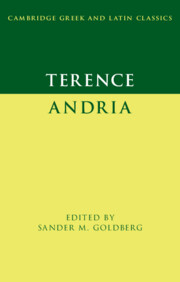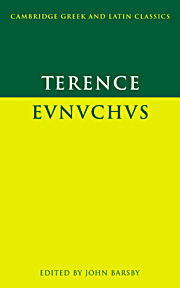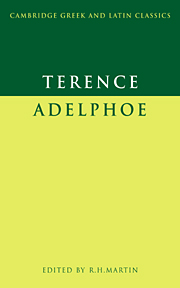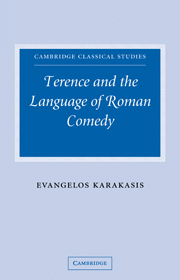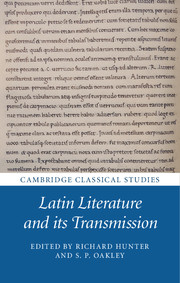Terence: Andria
Part of Cambridge Greek and Latin Classics
- Date Published: November 2022
- availability: In stock
- format: Paperback
- isbn: 9781009200660
Paperback
-
As the first play of the Terentian corpus, Andria has always attracted a special level of attention. It was the first Roman comedy produced after antiquity (at Florence in 1476) and the first translated into English, and it has inspired writers from Jonson and Dryden to Thornton Wilder. It provides an excellent introduction to Terence 's particular style of comedy, noteworthy for its ambivalence in representing the perspectives of woman and slaves and its experiments with a secondary plot line. The commentary is designed both to help students with the basic linguistic and technical problems confronting inexperienced readers of Roman comedy and to open discussion of essential interpretive questions involving the play and its relation to the wider comic corpus, as well as the utility of comedy for furthering our understanding of the Roman world and its values.
Read more- Enables students to master the challenges of Terence's language, thus making their reading of the play more enjoyable
- Adopts a practical, modern approach to understanding the principles behind metrical practice so that students gain a better sense of Roman comedy as a musical theatre
- Supplies headnotes discussing the action and blocking and notes in the text including stage directions that enable students to imagine the play as a living performance
Reviews & endorsements
'The Commentary is of a very high quality. In addition to ensuring that matters of dramaturgy are constantly and fully dealt with, changes of scene or act being notably well handled (there is a good example at [IV.i], lines 625–83) G. is alive to every nuance of Terence's Latinity and style … Any student who is called upon to work on this play will assuredly find all (s)he needs in this outstanding and authoritative edition.' Colin Leach, Classics for All
See more reviews'Goldberg's work on Andria provides a great contribution in English, useful for both students and scholars … [his] commentary is exhaustive: it provides students with a great help in reading and understanding Terence and scholars with the basis for further study.' Carmela Cioffi, Exemplaria Classica
Customer reviews
Not yet reviewed
Be the first to review
Review was not posted due to profanity
×Product details
- Date Published: November 2022
- format: Paperback
- isbn: 9781009200660
- length: 306 pages
- dimensions: 216 x 138 x 17 mm
- weight: 0.4kg
- availability: In stock
Table of Contents
Introduction
P. Terenti Afri Andria
Commentary
Appendix I. Alternative Ending(s)
Appendix II. The Greek Models
Appendix III. Cicero's Andria
Works Cited
Index.
Sorry, this resource is locked
Please register or sign in to request access. If you are having problems accessing these resources please email [email protected]
Register Sign in» Proceed
You are now leaving the Cambridge University Press website. Your eBook purchase and download will be completed by our partner www.ebooks.com. Please see the permission section of the www.ebooks.com catalogue page for details of the print & copy limits on our eBooks.
Continue ×Are you sure you want to delete your account?
This cannot be undone.
Thank you for your feedback which will help us improve our service.
If you requested a response, we will make sure to get back to you shortly.
×
